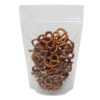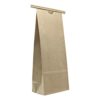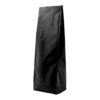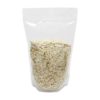Blog
Does Coffee Go Bad?
Most new coffee enthusiasts tend to go on a shopping spree and accumulate way too much coffee in one go. The result is a stockpile that could supply an army. After the novelty of variety has died out, the first question that comes to mind is whether the coffee will go bad.
It is a dry substance, so can it actually go bad? The short answer is that it can, and it will go off if enough time has passed. If it isn’t stored properly, the rate of deterioration will only increase. But how can you tell if your beans have gone bad?
There are a couple of signs that you can look for to see if your next cup will not be any good.
What happens to coffee when it ages?
Coffee is a complex substance that is made up out of thousands of strands of different compounds. Coffee consists of a combination of carbs, amino acids, and lipids, to name a few. Regardless of the dry texture, these compounds undergo significant changes as it waits to get brewed. When enough time goes by, the coffee undergoes both physical and chemical changes that change the aroma and taste of the coffee.
The carbs in coffee tend to go stale, the lipids turn rancid, the organic compounds tend to evaporate, and the amino acids and other compounds undergo chemical changes as it is exposed to oxygen and water.
Depending on the level of exposure to oxygen and water, the coffee can undergo quite significant changes. In certain cases, these changes are sought after, but for the most part, it leaves your coffee tasting bland and not very aromatic.
How long can you store coffee?
The state that the coffee is in will generally determine how long it can be stored. Whole beans tend to last longer than ground coffee. Instant coffee has a practically indefinite shelf life and will last as long as it doesn’t become moist.
How you store your coffee will also have a definite effect on how long it actually lasts. The rule of thumb is that you should store your coffee in a cool, dry and airtight container in the dark. If you store it this way, your ground coffee should last for a couple of months after the expiration date, whereas the whole beans can last as long as nine months.
If you stick your coffee in the freezer, you can extend your coffees live for anything between one and three years. Be warned, however, that when you choose to freeze your coffee, it tends to lose most of its flavor. Once you thaw out your coffee, it won’t be off, but it won’t have much flavor either.
If you are a frequent coffee drinker, however, you probably have a bag of decaf at the ready for those guests that can’t do coffee in the evening. In this case, the best course of action is to keep the coffee in its sealed packaging. These packages are often filled with nitrogen and won’t oxidize the coffee.
What happens to stored coffee?
Before we get into that question, it should be noted that coffee should be used as close to the roasting date as possible. If the roasting date is unavailable, check the expiration date. Usually, this date is about a year after the roasting date. This means that the further you are from the expiration date, the better your coffee will taste.
Coffee is not like wine, under no circumstances do you want your coffee to age. For the best-tasting coffee, it is best that you use the freshest coffee available. The peak of flavor can vary according to the type of bean, the type of roast and also the brewing method that is used to make that perfect cuppa.
If your coffee was stored well, it should have most of its flavor a couple of months after the expiration date. It is when your coffee becomes oxidized and moistened that the flavor is altered. Your nose is your best indicator of whether your coffee is bad or not.
If it smells dull, rancid, and moldy, you should rather throw away the batch and open a new package. If you get a dull and flat aroma from the coffee, your coffee will also taste flat and dull.
Although you might not become ill from drinking coffee that is passed its sell-by date, you definitely won’t get the full flavor that you wish for either. The reason for the loss of flavor is due to the loss of nutritional value.
Like tea, coffee is made up of a combination of various compounds. Coffee is very high in anti-oxidants, and there is research that has shown that coffee might contain more antioxidants than cocoa and even certain herbal teas. When you store coffee for too long, these anti-oxidants tend to deteriorate and the essential oils that give coffee its aroma and flavor evaporate as well.
The bottom line is that if you want the best from your coffee, you should try and consume it within the first two weeks of purchase. Apart from the time that it is stored at your house, it also spent some time on the shelf in the store.





